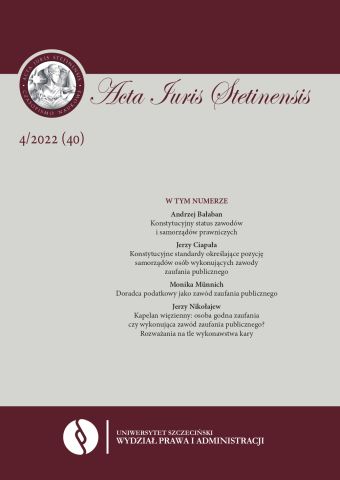Konstytucyjne standardy określające pozycję samorządów osób wykonujących zawody zaufania publicznego
Constitutional standards that define the position of self-governments of persons who practice professions of public trust
Author(s): Jerzy CiapałaSubject(s): Law, Constitution, Jurisprudence, Constitutional Law, Administrative Law
Published by: Wydawnictwo Naukowe Uniwersytetu Szczecińskiego
Keywords: constitutional standards of the position of professions of public interest; terminological comment on the concept of such professions; aims of representing the interests of the socio-professional grou
Summary/Abstract: Pursuant to Article 17(1) of the Polish Constitution of 2 April 1997, “self-governments may be created within a profession in which the public repose confidence, and such self-governments shall concern themselves with the proper practice of such professions in accordance with, and for the purpose of protecting, the public interest”. This study intends to present and analyse constitutional provisions and to use them to attempt to define constitutional standards. Therefore, I present: 1) comments on the intentions that accompanied the work on the Constitution, 2) the most basic constitutional norms that set the directions of law-making and of constructing assumptions for the functioning of professional self-governments (corporations), 3) terminological comments on the concepts of “profession”, “free profession”, “regulated profession”, and “profession of public trust”. The latter term takes on features of a concept that is not typical to most constitutions of other countries, hence I present a more extensive discussion on the rules of meaning which should be given to the phenomenon of public trust with the understanding of the features of this profession in Poland. This paper focuses on two basic tasks of professional self-governments, i.e. 1) representing the interests of the socio-professional group of persons who practice professions of public trust and 2) orienting the practicing of the profession towards the implementation and protection of the public interest. Managing these two tasks in parallel has caused and is still causing certain tensions and disputes between the relevant circles and even among legal scholars and commentators. The article does not ignore the fact that the analysis of the position of corporations of persons performing public-trust professions must currently take into account the unwholesome phenomena brought about by the post-2015 systemic and political crisis.
Journal: Acta Iuris Stetinensis
- Issue Year: 2022
- Issue No: 40 (4)
- Page Range: 19-42
- Page Count: 24
- Language: Polish

